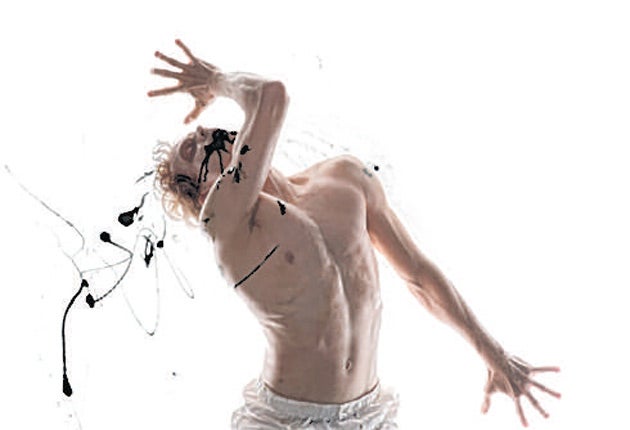A dancer about to undergo a big change
Kafka's story about a man who becomes an insect lends itself exceptionally well to dance theatre, says Jessica Duchen

Your support helps us to tell the story
From reproductive rights to climate change to Big Tech, The Independent is on the ground when the story is developing. Whether it's investigating the financials of Elon Musk's pro-Trump PAC or producing our latest documentary, 'The A Word', which shines a light on the American women fighting for reproductive rights, we know how important it is to parse out the facts from the messaging.
At such a critical moment in US history, we need reporters on the ground. Your donation allows us to keep sending journalists to speak to both sides of the story.
The Independent is trusted by Americans across the entire political spectrum. And unlike many other quality news outlets, we choose not to lock Americans out of our reporting and analysis with paywalls. We believe quality journalism should be available to everyone, paid for by those who can afford it.
Your support makes all the difference.One day Edward Watson awoke to find that he had been transformed into a giant insect. The Royal Ballet star is at the centre of a new dance version of The Metamorphosis, a commission for ROH2 that brings Kafka's famous novella to life. Absurd and tragic, symbolic and surreal, it lends itself to dance theatre very well, according to the creative team behind it.
Watson is pale, red-haired and renowned for his intense dramatic ability; choosing him to portray Gregor Samsa was a stroke of inspiration on the part of the choreographer, Arthur Pita: "I'd read some interviews in which Ed talked about being a 'ginger prince' and feeling like a freak at the same time – I thought that was incredibly honest," says Pita. "There's something Kafkaesque about his presence," he half-jokes, adding more seriously: "On the first day we began with Ed waking up as the insect – and it was perfect." The staging, he adds, enhances the story's intimacy. "It's performed in traverse, so the audience will be very close."
Kafka's writing contains a wealth of physical description as the unfortunate Gregor-as-insect tries to work out how to turn round or manoeuvre himself across the room; all this fed the developing dance work. "The fascinating thing for me has been discovering ways in which to move that aren't human at all," says Watson. "For instance, you can't put a hand on the floor, push yourself up and walk, because that's too human. We got stuck a few times: Arthur would ask me to move in a particular direction and I literally couldn't – I'd never been in positions like that before."
The music also pushes at boundaries. It is by the eclectic composer and multi-instrumentalist Frank Moon, who also worked with Pita on the outdoor extravaganza Utopia; he performs most of it himself. "It's an 80-minute piece with lots of highs and lows," he says, "so I've mixed together all sorts of strange sounds, instrumental and electronic, and I even play the violin and sing, which I don't usually do." The range of "strange sounds" apparently includes everything from Jewish klezmer and Czech folk music to minimal, atmospheric sound-effects and even beat-boxing. "We started by improvising together," says Moon. "We just brought a lot of eggs into the room and saw what hatched."
Essentially, The Metamorphosis is a family story: reacting to Gregor's transformation, his parents and sister all undergo changes of their own. "You see everybody's metamorphosis at some point," says Watson. "Gregor doesn't seem that important, in some ways – the story starts with his change, but what's really important is how that affects everybody else, making them change their lives or thoughts and change towards him. It's so painful that he can understand them, but they can't understand him."
At one point, Gregor's father tries to kill him by pelting him with apples: "It's horrible," says Pita, "but you have to tackle the domestic violence aspect in order to live the story. "It's about a family in trauma, losing someone and how you react to that – perhaps to someone who is ill, who you don't recognise any more," he suggests. And yet that remains only a suggestion. "It's as if every sentence of the book could mean four different things," Watson says. Moon adds: "Kafka gives you symbols, metaphors and meanings – then takes them all away again."
That ambiguity makes The Metamorphosis perfect for dance, says Pita: "Physical theatre can express those metaphors in a way that describes very successfully what's happening in the relationships. Through the poetry of the movement you can keep all the psychological subtexts going.
"The story feels so modern and so relevant to now that it's hard to believe it was written so long ago," he continues (it was first published in 1915). "I hope that everyone will be able to relate to the pain that Gregor goes through."
It's not all doom and gloom, though. "It's fun in its absurdity," Watson declares. And Pita concludes: "You have to laugh in order to cry."
'The Metamorphosis', Royal Opera House 2, London WC2 (020 7304 4000) 19 to 24 September
Join our commenting forum
Join thought-provoking conversations, follow other Independent readers and see their replies
Comments